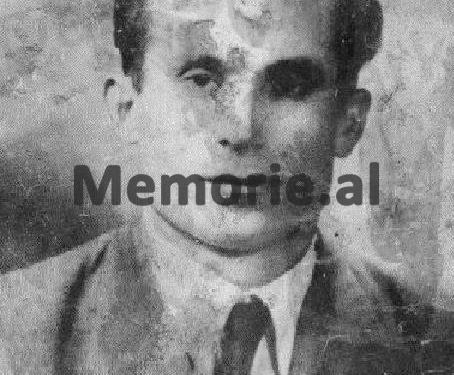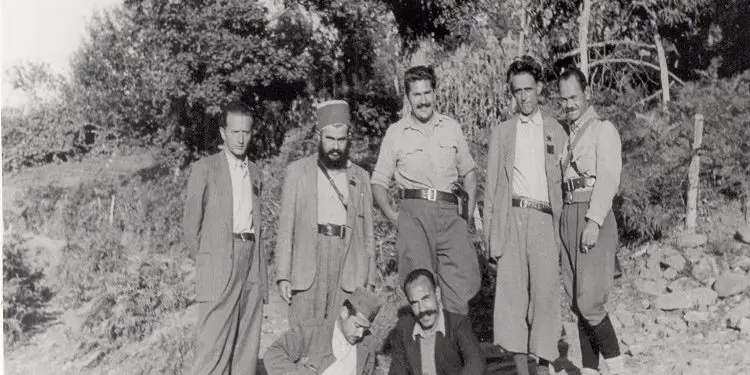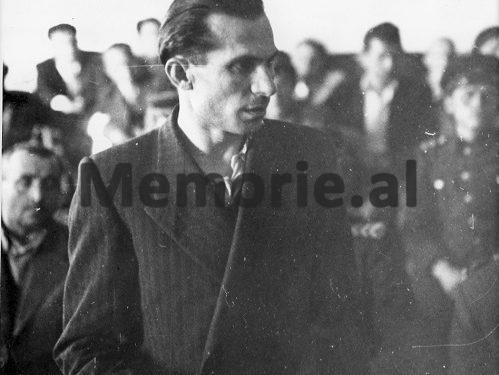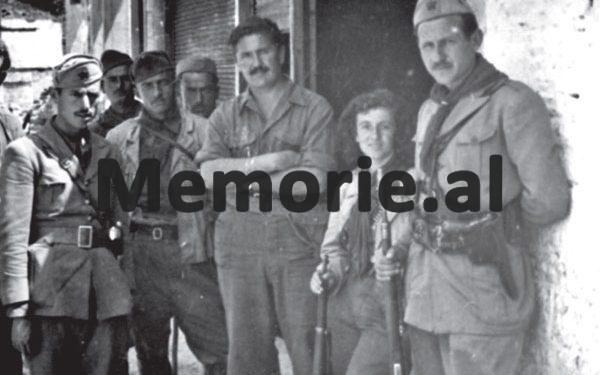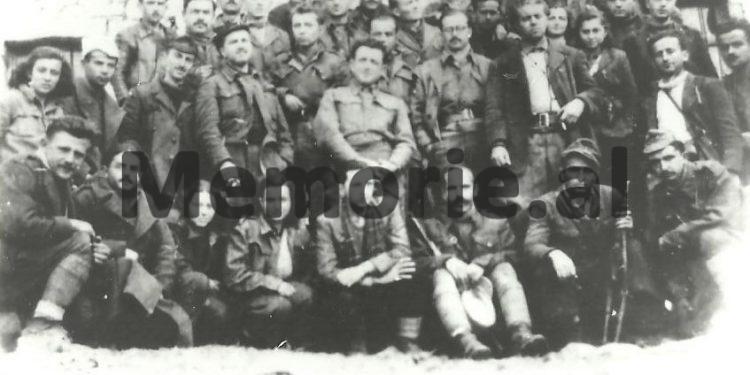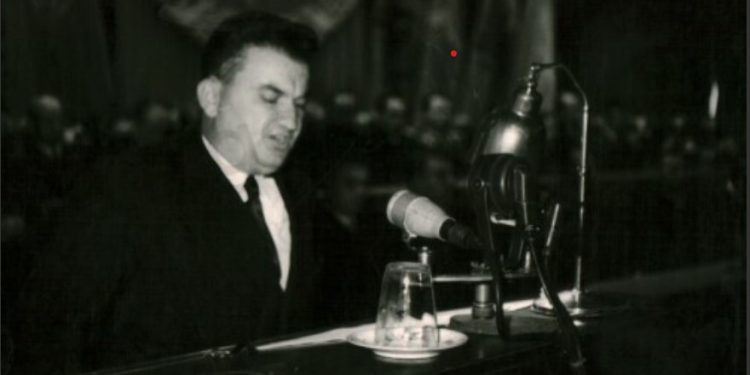By Gjergj Titani
The fifth part
Memorie.al / For the first time, we were able to provide the testimony of the witness of many historical events. The conversation with Pandi Kristo, a senior figure of the Communist Party of Albania and the Albanian state, took place in Tirana, in the house of his son-in-law, Robert Vullkani, where he was forced to live, when he was released from exile, since the Albanian democratic state, never gave him a home. The regime, for which he fought, targeted him to liquidate Pandi Kristo, placing him in the group of Koçi Xoxes, convicted for “hostile activities”. For 42 years in a row, I would wander the prisons of the communist dictatorship and successive exiles, until communism was overthrown forever, at the beginning of the 90s. The interview was conducted in the years 1992 – 1993 and over the years, it was completed, according to the memories and family archive of Pandi’s daughter, Assembly Kristo (Vullkani), sister, veteran of the Anti-Fascist National Liberation War, his son-in-law, Robert Vullkani and the memories of many contemporaries. Here is Pandi Kristo’s confession.
Continues from the previous issue
Mr. Kristo, we are at the time when the development of the work of the Second Plenum of the Central Committee was being prepared. You are the first chief of the information service, or as we are often used to hear, chief of Intelligence of the National Liberation Army. What criteria was your work based on?
In the summer and autumn of 1944, the general military-political situation in our continent and the Balkan region was extremely favorable for the Great Anti-Fascist Coalition. The Red Army troops, on the Eastern Front, were already fighting outside the administrative borders of the Union of Soviet Socialist Republics. They were fighting successfully in the territories of Poland, Romania, Bulgaria and in the north of the Scandinavian countries. The Second Front had been opened in Europe, by the allied troops, carrying out a landing, a giant naval and air landing, on the western coast of France and thus breaking the Nazi myth of the “Atlantic Wall”.
On our peninsula, it was fought heroically from south to north, from Greece to Kosovo and even Bosnia. The liberation of our country, Greece, and other southern regions of Yugoslavia, was a matter of days. However, we had accurate information, from highly confidential sources with the EAM forces, that in the summer of 1944, it was decided to hold a large secret meeting of the entire nationalist anti-Albanian political emigration in the city of Thessaloniki, which was controlled by EAM forces. This meeting had as its political theme: “The future of South Albania”, meaning also Northern Epirus, after the departure of the Nazi occupation troops. In this meeting, which was held in flagrant opposition to the spirit of the Atlantic Charter and the end of World War II, and liberation from foreign invaders, issues of national integrity would be discussed.
We knew that in this meeting, in addition to the large number of political immigrants and various Albanian nationalists from the diaspora, there would also be many senior Albanian personalities present, such as the former Albanian Prime Minister in exile Koço Kotta, Selim Mborja, Xhevat Leskovik, and others, who already, as a result of the decisions of the Congress of Permet, had lost all their official administrative attributes, such as: ministers, deputies, senior officers of the army or gendarmerie, judges, prosecutors and others. At this meeting, the Greek Royal Government in exile, located in Cairo, Egypt, would send its representative, who was the Minister of Education, who was brought by a submarine of the English Navy to the port of Thessaloniki, where the meeting in question took place.
We decided that in cooperation with the Korça District and the secret and legal Greek police forces of the EAM, we urgently send, through the border point of Kapshtica, to Thessaloniki, a trusted but also specialized group of our best people, brave and loyal. Even from the headquarters of the Defense battalion of the General Staff, we started one of our bravest commanders and close friends of Zaho Koka, who would later become a valuable cadre of Military Intelligence and even be put in charge of this service, which would extend the field of its activity, not only to neighboring countries, such as Yugoslavia, Greece or Italy, but also more widely in the Near and Middle East, but also for the benefit of positive experience as far as Vietnam, in Israel-Egypt conflict, North Korea, China and others.
In the meantime, the group of our detectives, which was assigned to carry out this very important and dangerous operation, arrived in Thessaloniki, with the task of bringing down, even by deception, the former prime minister Koço Kotta and his group. and to carry out their transportation to Albania and upon arrival in the country, to organize his arrest. I must emphasize that, from the center, we directed the successful execution of the operation, maintaining regular contact, not only with our intelligence group, but also with the intelligence of the Greek anti-fascist fighters, who were led by the Greek Communist Party. It was precisely this Information Service, which had fallen on the trail of this anti-Albanian mission, with high risk, which called into question and brought great concerns, the territorial integrity of Albania.
Before this operation was carried out, we were very anxious to avoid the departure of the representative of the Quisling government in Greece, which was Dhimitër Fallo, and to get hold of all the accompanying documentation of the Albanian government, in this infamous conference. I remember that, from the operational reports that I sent to the operational service in the center, I learned that the guerrilla unit of Korça, knowing Dhimitër Fallon well, skillfully organized his physical elimination, grabbed his bag with relevant documents and put them on the body of holding out a business card “from the Albanian Communist Party”. I must emphasize that Selim Mborja, as a result of his cunning, was able to hide from the operation in Thessaloniki, he escaped. For the sake of the truth, it must be said that Koçi Xoxe himself, who knew the situation in Greece very well, was commissioned by Albania to lead this operation.
It is already known that the old and very experienced driver from Korça, more precisely from the village of Sinicë i Devolli, who transported our group and the two wanted persons, was the wise communist and staunch anti-fascist, Jorgo Deli. Koço Kotta and Xhevat Leskoviku were tried as enemies and sentenced as war criminals, with life imprisonment. Ironically, Koço Kotta died in that prison, which he had built himself, when he was prime minister of Zog. A few days after Koço Kotta, his wife also came to Albania, who, as far as I know, was interned in the villages of Lushnje. I emphasize that a group of Greek soldiers also played a significant role in the discovery and transportation of the former Prime Minister of Zog.
What about our forces that were already in the North of Albania, what was happening?
As a necessity of the time, the Intelligence and Intelligence Service in the armed forces was gradually established and strengthened. The operational sections of this service were created, which, despite the difficulties of the beginning, were working quite successfully. One of the most exemplary informants of the Army was the highly trained, cultured and brave cadre, Xhaferr Cenko Lubonja, whom I had known long ago, when he was one of the leaders of the partisan forces in the area of Vithkuq and Kolonja. and then, deputy commissar of the fourth battalion, of the IV Assault Brigade. He was killed in Mirdita, together with the deputy commander of this brigade, Pano Xhamballo, an excellent and promising member of the War, under difficult and somewhat enigmatic circumstances.
I had received some secret reports from Xhafer that he had managed to create an understanding with the nationalist leaders of the North and was in negotiations to organize a large assembly with them for a cooperation between these opposing forces, which were operating in The area of their bajraqs, but the sectarian and very harmful attitude of Liri Gega, who had received orders from Miladini and Dushan, to kill Mustafa Gjinishi and other nationalist leaders of the North of the country behind their backs, made this process, not only to fail, but it brought fierce and armed clashes between our forces and the nationalist ones. Xhaferri was probably the future of post-war Albanian Information and Discovery, but bitter fate caused this excellent staff to die very quickly.
In this way, one of the most indispensable and necessary services of the new state that was being formed was being consolidated. Let’s not forget that the Intelligence and Intelligence Service of the new state that was being created was the eye, the ear, the mind, the analysis and the conclusions of everything invisible anti-state that happened and could happen, at all times. For this, we engaged the most pious cadres and were convinced that we were doing the right thing. I will not speak here of the results of this noble service, which would be reflected over the years. In these circumstances, the Second Plenum of Berat was being prepared, for which I think that the people who were against its development were Miladini, Enveri, Mugosha (who had already left our country for Yugoslavia), Liri Gega and another one.
The Plenum of Berat is said to be one of the most important in the history of the NPSH and the country. What do you think about it?
The Second Plenum of the Central Committee of the KPSH met in Berat, from November 23 to 27, 1944, and if it hadn’t been for the holiday of November 28, which we should celebrate in the liberated Tirana, it it would continue for many more days. With the insistence of Velimir Stojnič, Niaz Dizdarevič, Koçi Xoxes, Sejfulla Maleshova, Nako Spirut, contrary to Miladin’s wishes, this Plenum was prepared. I want to emphasize that, on the eve of the Youth Congress in Helma, the representatives of the two great allies of the Great Anti-Fascist Coalition, the USSR and the USA, as well as the representatives of the Yugoslav Communist Party, arrived at the General Staff of National Liberation Army, with the exception of Velimir Stojnič and Niaz Dizdarević, who were also representatives at the Central Committee of the NPSH.
Meanwhile, Miladin Popovici did his best not to allow the new Yugoslav emissaries, who had come with a new spirit to the Central Committee of the NPSH, and to replace him. The plenum was attended by all the senior members of the Central Committee and many leading personalities of the NPSH and the Anti-Fascist National Liberation War, who were expected to be co-opted into the leadership bodies of the NPSH. Necessarily, the representatives of the Yugoslav Communist Party also participated in the proceedings of this plenum, who brought the new spirit sent by the Yugoslav leadership and Marshal Tito. I remember well that the spirit of the plenum’s work was one of the most transparent and democratic that had developed up to that time.
The spirit of command, cultivated for almost four years by Miladini and Enveri, was completely missing. The first report: “On the political situation”, was presented by Sejfulla Maleshova and I would be very happy to read it once more. The second report “On the political line of the KPSH”, in the capacity of the Political Secretary of the KPSH Central Committee, was presented by Enver Hoxha, who claims that he was not allowed to present the version of the report that he had prepared. . Could this claim of Enver be true?! I say no, since next to this report, there is a self-critical, very extended report of Enver Hoxha, which I will conceptualize, with only two words, that he said in the plenum: “Others remembered that I was one of the leaders of Communist Group of Korça, but I was only a sympathizer of it, I was not a member…! I was thinking, as Ali (Miladini) thought, and no more.”
Therefore, I am quoting some words that have remained in my mind from Tuk Jakova’s discussion in the plenum: “Our party has never been independent. It was concentrated only in the hands of Miladin and Dushan”. Before him, Sejfulla Maleshova had spoken very harshly, who had declared that; Enver Hoxha, although he is considered as the example of our LANÇ and KPSH successes, in reality, he was the synthesis of their mistakes…! Below, he would continue with his proverbial courage: Sectarianism, not only in the Party, but also in the army, gradually degenerated into terror, and it is not at all strange how this terror degraded into crime, even into organized crime. “. The wise Sejfullai would not hesitate to boldly proclaim in the Plenum of Berat, even two years later, when he would be expelled from the Political Bureau and the Central Committee of the NPSH, that: “if you continued on this path, you would you turn very quickly into a clique, even a clique of murderers….”!
But, let’s continue with my memories, about the Second Plenum of the Central Committee of the NPSH. The third report: “On the organizational line of the NPSH”, was held in the capacity of the Organizational Secretary of the Central Committee of the NPSH, from Koçi Xoxe. From the discussions on the organizational issues of the Party, it came to light that, Miladin Popovic, had subjugated the Political Bureau of the Central Committee of the NPSH, but to some extent, the circulars or the command and headquarters of the units, in order to impose them in all directions. The members of the Plenum, in their discussions, emphasized that, only after the departure of Popovic, these last months, they were able to free themselves and breathe freely, in solving their problems.
They had remembered that with the arrival of the Yugoslav emissaries, since the founding of the Party, they would find full support, help and support from them, but, the delegates of the plenum emphasized, they were disappointed, because he, together with Enver Hoxha, had great political and organizational mistakes had given the activity of the KPSH, extraordinary distortions. But, if Enver admitted from the beginning some of his mistakes, it was different with Miladin’s character, he was tough and did not admit anything. I want to emphasize that Enver, in the Plenum of Berat, was criticized in general and concretely, as a blind tool of Miladin Popovic and Dusan Mugosha, who bear a great historical responsibility, who chose this man, to elevate him to the highest positions of the leadership of the Party, the Front, the Army and the Power, although this, as he himself affirmed during those critical but realistic days of the plenum, was not distinguished for special abilities, as the leader of the LANÇ, as the Commander of Supreme, as General Secretary of the Party, and others.
Thus, the proceedings of the plenum presented a completely different image of Enver, from the official versions that present the materials of the ALP and the works of this heartless and incompetent man, which shamelessly present him as a member of the Communist Group of Korçës, who made us the law in this group, founder of the Albanian Communist Party, organizer of the Anti-Fascist National Liberation War, founder of the Albanian Democratic Front, creator of the Army, architect of popular power, as one of the most ardent fighters of Titista plans, in internal affairs of Albania, and others. But, knowing the capabilities of Enver Hoxha’s diabolical distortions and not only Enver’s, but also his lackeys, knowing in advance that this great deception would one day be unmasked and come to light, as I said above, he does not hesitate to distort the truth of historical facts, from 1935-’36, until he closed his eyes, except for the pauses of calm, which he created in different fragments of time.
I do not undertake to analyze this historical and great plenum, I would say, because today I am not able to be an analyst or a historiographer or a sociologist. I am just a former leader of the NPSH, now old, who is transmitting to the new generation, my thoughts, my memories and some emotions of my life. Shocking were the criticisms of the great crimes and sectarianism that had been shown in different provinces. From a discussion by Manush Mufti, I remember that the whole hall was shocked when we heard that the command of the Fifth Brigade had gathered the village in a so-called conference and there they had shot 22 people. Or, when the forces of the Brigade entered Kurdari i Mati, besides burning 10-15 houses, in one of its villages, they killed 20 innocent villagers without trial.
The continuous sectarian and terrorist attitudes of Liri Gegë, when she and Dushani were in the Vlora District, or the terror exercised by the First Brigade, shooting dozens and dozens of innocent villagers in Lushnje, were severely criticized in the plenum. others. I remember that very interesting discussions were held by: Nako Spiru, Tuk Jakova, Kadri Hoxha, Bedri Spahiu, Gogo Nushi, Koçi Xoxe, Naxhije Dume, Ramadan Çitaku, Hysni Kapo, Manush Myftiu, Kristo Themelko, Alqi Kondi, Kiço Njela, and others, taking the floor, several times freely, but among these, I want to mention a very touching discussion of my friend, Gogo Nushi, who emphasized that he had received a directive from the Central Committee of the NPSH, for the disappearance of some great personalities, such as: Sotir Kondi, who emphasized that he was a democratic nationalist patriot, who joined the Anti-Fascist National-Liberation War and was later elected its president, or the physical disappearance of the old member of the Party, Anastas Plasari, a well-known intellectual, one of the leaders of the Communist Fire Group, since March 1943, when I was running the Korça District, he was accepted as a member of the NPSH. An outstanding personality, who was later unjustly persecuted for a long time.
Further, Gogo continues that: “We received directives to kill Zef Mala, but we were convinced that the order given to us was wrong and we did not follow it. But how can we explain the murder of Gjinishi, or the murder of Mynir Djindi, member of the District Committee of Vlora? We have noticed this spirit of criminality in recent days in Tirana, about 60 people have been killed by the ‘Discipline Battalion’ and if this continues, their number may exceed 100. I did not agree, because these acts show our impotence”. If we continued like this, with the other discussions, a picture would be created so gloomy that it would be very sad for those forces, which were on the threshold of liberating the country. I ask; why did the victors need this terror, when they were at the end of the War and should arouse the enthusiasm of victory? What was this spirit of criminality? Nothing else, but the spirit cultivated during four years by our internationalist “friends”.
Today, after so many years, I can say that; not the duration of the plenum’s proceedings, was the main thing, but the transparency, the deep analysis of the activity of the Central Committee of the KPSH, the sincerity of the discussions, even the denunciations in this Plenum, the deep content of these discussions, the pain and concern they expressed the members of the Central Committee for the mistakes made and not the ones that Enver Hoxha declared after so many years, in his book “Titistes”, I was surprised by Enver’s gambler’s courage. I dared not to have any respect for the historical facts and truths of the Party and others. The Second Plenum of Berat was the only meeting that resembled a congress, a great national analysis, where a great democratic spirit and extraordinary transparency has been shown. I think that, if the party analysis and the activity of the NPSH had continued, in that spirit, the history of Albania and the NPSH would not have been so tragic and bloody…! Memorie.al
The next issue follows




